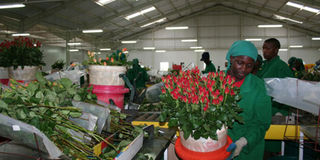Alarm as East Africa fails to strike export deal with EU on fresh produce

A worker at the Oserian Flower Farm in Naivasha, Nakuru prepare roses for export. Despite being slapped with a higher tariff to access the country’s biggest market in Europe, horticulture registered growth in earnings for 2014, albeit marginal. FILE PHOTO |
What you need to know:
- Reports indicate that a section of exporters are considering relocating or channelling exports through Tanzania or Ethiopia, based on these nations’ status as Least Developed Countries (LDC). All LDCs enjoy special terms and conditions of trade worldwide.
Panic has gripped fresh produce and exporters in East Africa following failure to reach an economic deal between the East African Community and the European Union, a key trade ally.
This comes after the two parties failed to agree on key points.
Reports indicate that a section of exporters are considering relocating or channelling exports through Tanzania or Ethiopia, based on these nations’ status as Least Developed Countries (LDC). All LDCs enjoy special terms and conditions of trade worldwide.
Mr Richard Fox, director of Sustainable Development at Finlays Flowers, said the delays were a great concern to the industry after competing producers elsewhere “long did it”.
“Columbia, which is a strong competitor, has reached a deal with the European Union. Failure to reach an agreement means our exports to the EU will start to incur duties. It means that Kenya will become uncompetitive because all the other EAC countries and Ethiopia are LDC,” said Mr Fox.
The EAC bloc is looking to seize the advantages presented by the EPA and to maintain Duty Free Quota Free access for all Kenyan exports to consumers in the EU.
Should the EAC fail to conclude the agreements, previously tax exempt products — cut flowers, fruits, fish, beans, coffee and tea — to the European Union would attract duty ranging from 8.5 per cent to 14.5 per cent, making them less competitive and significantly cutting the returns to growers.
Ms Jane Ngige, chief executive officer of the Kenya Flower Council, the industry lobby for large-scale growers, said panic had gripped the industry following protracted talks without a permanent pact being reached.
She was, however, optimistic that a pact would be reached at the next round of talks slated for mid-May. “We are still enjoying quota free access. The issue will be serious after October 1,” she added.




